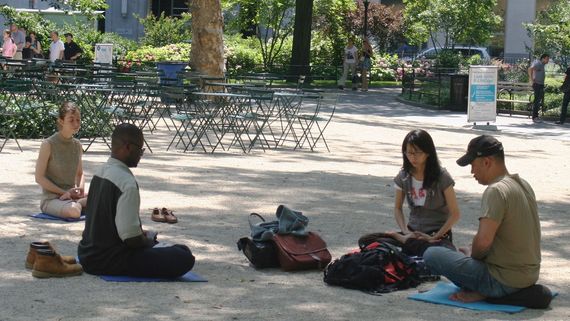This article was originally published in Quartz
As those of us in the Northern hemisphere settle into the autumn, I'm mindful of persistent advice from business gurus telling me that I should be practicing mindfulness, but I'm even more mindful that mindfulness has become one of the most overused, watered-down tropes of the year.
The television series Silicon Valley nails this problem on the head, when it has Gavin Belson, the chief executive of Hooli, the show's Google-like fictional technology company, consulting with his spiritual adviser for ways to use yoga and meditation to crush his opposition.
There's nothing wrong with mindfulness in itself. But what we have now is too much mindless mindfulness. We pause for the sake of pausing instead of with a purpose.
Ralph Waldo Emerson once wrote: "In each pause, I hear the call." In pausing, we can reflect to hear our call. In a pause we can reconnect ourselves with our core values, principles and deep-seated beliefs. We can then reimagine a better path and be propelled onto it with newfound momentum.
Helping employees pause to connect to their moral selves is not faux spirituality or some flighty new age indulgence--it is a critical step for the survival of a modern organization.
Reliance on the moral judgment of each individual in your organization may seem scary, but it is at the very core of what I call our new Human Economy. In the industrial age, all we wanted from our employees was rote repetition without questioning of the larger mission. Now machines can out-think, out-process and out-perform us, but it's the things machines cannot do, the things that come from the heart where our values reside--character, creativity, compassion and humility--that are uniquely valuable to today's companies.
In the Human Economy, an employee's job is no longer to do the next thing right, but to do the next right thing. A machine can be programmed to do the former, but only a human being can do the latter.
In a controlled experiment, employees at Wipro, an IT/Tech support firm in Bangalore, India, were split into three groups and given sets of puzzles to solve, as part of a month-long training exercise. The control group took a break between rounds to just relax; the "reflect" group took the time to think about how they solved the problems; and the "sharing" group did the same but also created notes for others.
These were the results: "Over the course of one month, workers in both the reflection and sharing condition performed significantly better than those in the control group. On average, the reflection group increased its performance on the final training test by 22.8% more than did the control group. The sharing group performed 25% better on the test than the control group, about the same increase as the reflection group...
This was in spite of the fact that the control group had been working 15 minutes longer per day than the other groups, who had spent that time reflecting and sharing instead."
The barriers and structures that previously forced us to take regular pauses--time zones, physical distance, brick-and-mortar offices, national boundaries and landlines, to name a few--no longer do so. Work is always on. The New York Stock Exchange closes at 4 pm and only two hours later the Nikkei is open. Factory and fast food workers are expected to work in ever-changing shifts that can go completely around the clock. In many jobs, being unreachable at any hour is seen as some sort of sin.
But it is just because traditional methods of rest and reflection are falling away that we must come up with a new and more deliberate plan. This is why I strongly advocate that leaders become more deliberate in fostering environments that encourage pausing. That could even mean scheduling "work pauses."
The good news is that work pauses don't require a meditation room or a guru or a retreat to a fancy resort. They only require a conscience, which is after all what is supposed to be at the root of consciousness. Even the Buddha did not meditate for meditation's sake; he meditated to see the world as it truly was, without distortion or lies. He was able to do it all from under a Bodhi tree. No Napa resort required.
The role of business leaders should now include helping their co-workers to properly direct their work pauses. What should staff be thinking about when they return to work? What behaviors do they need to adopt to thrive in their own jobs and to help advance the company's goals?
Pausing to connect to beliefs is about more than just preventing disastrous mistakes--it is about building greatness. At its core, leadership is about how we get people to act and to join us. Inspirational leaders in the Human Economy trust people with the truth. They engage in two-way conversations.
They take stands on social issues. Above all, inspirational leaders see the path ahead as a noble journey because nothing inspires people more than being on a journey worthy of their commitment and dedication. What enables and inspires all of this is what happens in the pause.
In each pause, Emerson heard the call. Let us aspire to do the same, well after our summer tans fade.
